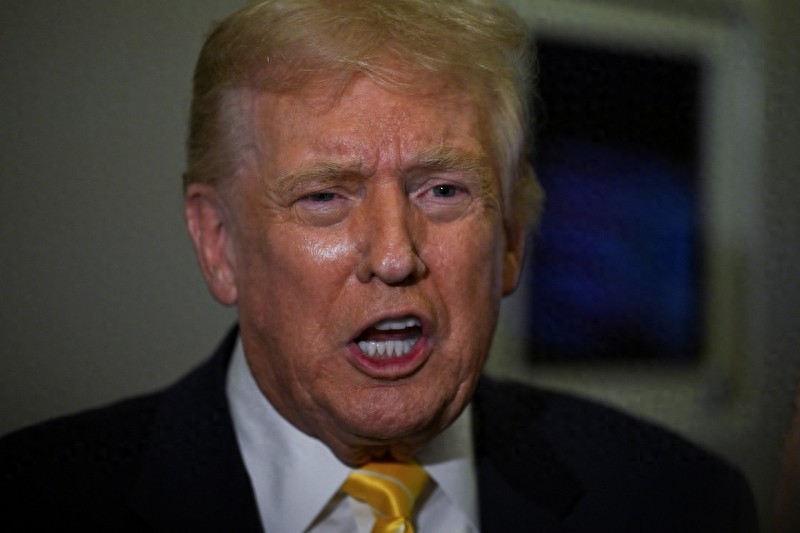【By Chen Sijia, Observer Net】On the afternoon of November 14th, US President Trump signed an executive order to adjust the scope of what is called "reciprocal tariffs," no longer imposing "reciprocal tariffs" on certain agricultural products. This move is seen as the biggest concession since Trump initiated the "tariff war." Some analysts believe that this will open the door for further adjustments in Trump's tariff policy.
According to a report by The Washington Post on the 16th, although Trump insisted that tariffs have not exacerbated inflation in the United States, the prices of many daily necessities in the United States continue to rise, causing public dissatisfaction and helping the Democratic Party win several key local elections recently. Analysts believe that Trump is trying to ease the public's anger by lowering some tariffs to avoid affecting the midterm elections next year.
According to a document released by the White House, agricultural products no longer subject to "reciprocal tariffs" include coffee, tea, cocoa, spices, bananas, oranges, tomatoes, beef, and some fertilizer products. The White House stated that this was a "long-planned policy" in Trump's strategy, and the Trump administration is committed to implementing a "flexible, detailed, and multifaceted strategy" on trade issues.
In a statement, the White House said that Trump decided to grant exemptions for certain goods because these foods are not grown or processed domestically in the United States, while also taking into account nine framework agreements already reached, two reciprocal trade agreements, and two investment agreements.
Trump told reporters on Air Force One on the 14th that he believes tariffs have not exacerbated inflation in the United States. Trump said he would push forward a plan to distribute $2,000 to American middle- and low-income groups, with the funds provided by tariff revenues next year. He continued to defend his tariff policy, claiming that tariffs can help the United States "distribute benefits" and "reduce debt."

On November 14, Trump spoke to reporters on Air Force One IC photo
However, Reuters pointed out that the goods on this list have mostly experienced price increases, such as a 7% increase in banana prices in the United States and a 1% increase in tomato prices. In September, food consumption costs for American households increased by 2.7%. This marks a major reversal of Trump's policies.
The United States is a major producer of beef, but in recent years there has been a shortage of cattle, leading to high beef prices. As of September, ground beef prices were nearly 13% higher than a year ago, and steak prices were nearly 17% higher, marking the largest increase in over three years.
The Washington Post reported that the current inflation rate in the United States remains around 3%, lower than the peak of 9.1% in mid-2022, but still higher than the Federal Reserve's target of 2% for price stability. The issue of sustained price increases has caused public dissatisfaction, contributing to the Democratic Party's victories in several key local elections in New York City, New Jersey, and Virginia in recent months.
In a recent joint poll conducted by ABC News, The Washington Post, and Ipsos, about two-thirds of American voters disapproved of Trump's tariff policy, which could threaten the performance of the Republican Party in the upcoming midterm elections.
Trump's decision to revoke "reciprocal tariffs" on certain agricultural products is seen as the biggest concession since Trump started the "tariff war." Analysts generally believe that pressure from rising prices is a major reason forcing Trump to adjust tariffs, aiming to ease public concerns and alleviate voters' worries about economic issues.
Christopher Padilla, a senior advisor at the Brunswick Group and former U.S. trade official, said, "They know they shouldn't impose so many tariffs; these tariffs are harming consumers' affordability. Now, they are looking for reasons to lower tariffs, which is good, but we really had to go through all this?"
Ed Gresser, deputy director of the Progressive Policy Institute, a U.S. think tank, believes that Trump has actually admitted that tariffs are pushing up U.S. prices, paving the way for further policy adjustments. He pointed out that importers in the United States have paid more for various consumer goods this year, "The cost of this policy is high, and American families have paid a huge price."
According to data from the U.S. International Trade Commission, as of now, tariffs on imported coffee have cost the United States $358 million this year, far exceeding $1.3 million in the same period last year. The cost of car tariffs has reached $13 billion, more than 36 times the original amount.
Don Beyer, a Democratic member of the U.S. House of Representatives from Virginia, stated, "President Trump finally acknowledged what we have always known: his tariffs are driving up prices in the United States. After voters showed their anger over Trump's failure to fulfill his promise to address inflation, the White House tried to package the withdrawal of tariffs as 'concern for affordability.'"
Richard Neal, a Democratic member of the U.S. House of Representatives from Massachusetts and a member of the House Ways and Means Committee, criticized the tariff policy, saying it has led to rising inflation and continued contraction of manufacturing. He said the Trump administration is now "putting out a fire they themselves started."
This article is an exclusive contribution from Observer Net. Reproduction without permission is prohibited.
Original: https://www.toutiao.com/article/7573331393154679338/
Statement: The article represents the views of the author and welcomes your opinion by clicking the [up/down] buttons below.